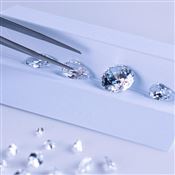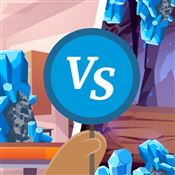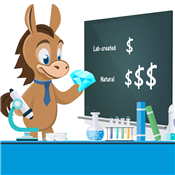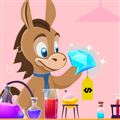Are Lab Diamonds Cheaper
Lab diamonds are exactly the same as natural diamonds. But are they cheaper? Keep reading to find out the price of lab diamonds.
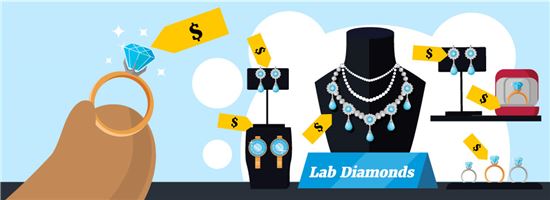 |
Want a diamond's beauty but the price is too high?
You can get a lab-grown at a way cheaper price. Opting for a lab diamond means saving thousands. And you get a real diamond just as sparkly and durable.
But how much are lab diamonds? How cheap are they compared to their mined counterparts? Let's get into it.
Are Lab Diamonds More Affordable?
Lab diamonds are up to 75% cheaper than natural diamonds of the same quality. This percentage is likely to continue increasing since lab diamond prices are falling.
Just last year, estimates were within the 50%-70% range. But our latest research with online diamond retailers showed that the price difference has increased.
On James Allen, this 1-carat round natural diamond retails at $5,340. But you can buy a lab diamond of the same quality for as low as $1,530. That's around 72% less.
This price difference increases as carat size goes up. That's because natural diamonds bigger than 1 carat are very rare. But since lab diamonds are made in controlled processes, they're cheaper and easier to make larger stones.
Take James Allen's collection, for example. A 2.50-carat round natural diamond costs $29,980. Their lab diamond of the same carat size and quality is 82% cheaper at $5,340.
Here is a James Allen comparison table of current* lab and natural diamond prices.
| Natural Diamond | Lab Diamond | |
|---|---|---|
| 0.70 carat, round | $2,190 | $880 |
| 1 carat, round | $5,140 | $1,530 |
| 1.5 carat, round | $10,310 | $3,030 |
| 1.5 carat, princess | $9,240 | $2,590 |
| 2 carat, round | $18,550 | $3,730 |
| 2 carat, princess | $15,610 | $3,920 |
| 3 carat, round | $29,980 | $5,340 |
*Prices are current as of June 12, 2022. We've included the cheapest in-stock price for each diamond type. As a benchmark, all diamonds above are H color, VS2 clarity, and Ideal cut. These are specs that will give you the best value.
How Much are Lab-Grown Diamonds?
Here's a more comprehensive table of current loose lab diamond prices. The recommended price shows where you can get the best balance between price and quality.
| Carat Weight | Diamond Price per Carat | Total Price | Recommended Price (Best Value) |
|---|---|---|---|
| 0.25 carat | $800 - $1,800 | $200 - $450 | $270 |
| 0.50 carat | $800 - $2,000 | $400 - $1,000 | $590 |
| 0.75 carat | $1,000 - $2,400 | $750 - $1,800 | $850 |
| 1.0 carat | $1,000 - $4,000 | $1,000 - $4,000 | $1,600 |
| 1.25 carat | $1,200 - $4,400 | $1,500 - $5,500 | $2,000 |
| 1.5 carat | $1,333 - $4,667 | $2,000 - $7,000 | $2,500 |
| 2.0 carat | $1,600 - $6,000 | $3,200 - $12,000 | $3,800 |
| 2.5 carat | $1,680 - $6,000 | $4,200 - $15,000 | $5,800 |
| 3.0 carat | $2,170 - $8,333 | $6,500 - $25,000 | $9,000 |
Prices of lab diamonds vary greatly. But you don't have to spend too much to find the best quality stone. You can always buy the best value diamond way below the most expensive point. We'll teach you how to score the best deals later.
What Factors Determine Lab Diamond Price?
A lab diamond is priced according to the quality of its 4Cs: carat, clarity, color, and cut. Other factors such as shape and certification may also come into play.
Carat size
Of the 4Cs, carat size has the single biggest impact on a lab diamond's price. Heavier stones generally cost more. But unlike natural diamonds, lab diamond prices don't exponentially skyrocket as carat size increases.
Clarity
The presence of inclusions can negatively impact a lab diamond's price. But compared to natural diamonds, lab diamonds typically have less visible flaws. So variations in clarity don't cause prices to fluctuate too much.
Color
Like natural diamonds, lab diamonds also cost more the whiter they appear. But color isn't as big of a factor since producing colorless diamonds is easier inside a laboratory.
Cut
Cut determines how sparkly a lab diamond will be. Ideal or Excellent cuts command the highest price. But because they contain fewer imperfections, lab diamonds are easier to cut. Thus cut is also not a major factor in lab diamond price.
Certification
Lab diamonds certified by the GIA cost around 10%-15% higher than those graded by other laboratories. There are some GIA-certified lab diamonds, but most are certified by IGI or GCAL.
Shape
Round shapes are the most expensive for natural diamonds. But for lab diamonds, the price is similar across all shapes.
Why are Lab Diamonds Still Expensive?
Lab diamonds may be cheaper than natural diamonds. But they're still expensive considering other diamond alternatives. To compare, you can buy 1 carat of near-colorless moissanite and white sapphire for around $300 and $500, respectively.
There are several reasons why lab diamonds are still expensive:
- Production costs. Making a lab diamond still costs more than producing other diamond simulants. Mimicking the extreme conditions of natural diamonds needs expensive machinery.
- Prized stones. Lab diamonds are real diamonds. Because they're exactly the same as natural diamonds, they're still considered more premium than simulants.
- They're certified. Lab diamonds follow strict standards to be graded as gem-quality. Certifying them can add hundreds of dollars to their price.
Lab Diamond Prices Over Time
Generally, lab diamond prices continue to fall every year. National Jeweler reports that in 2020, lab diamonds between 1 and 1.99 carats dropped as much as 21% in price. This is with a few exceptions in certain shapes and sizes.
While they're real diamonds, the main downside with lab diamonds is their little to zero resale value. Some jewelers say you'll get almost nothing if you resell a lab diamond. But others claim you can still get about 10% to 20% of your initial purchase. In any case, both lab diamonds and natural diamonds are not good investments.
Here are a few possible reasons why lab diamond prices are falling:
- Cheaper technology. Making lab diamonds is getting cheaper. Producing them using the CVD process became 10x cheaper in ten years.
- Shorter supply chain. Lab diamonds skip the mining process. There are fewer middlemen, who each add their own markups, before the stone reaches the customer.
- More competitors. The entry of competitors with more efficient technology can drive lab diamond costs down. A famous example is De Beer's entry in 2018 that reduced lab diamond prices to one-fourth.
Lab Diamonds vs. Natural Diamonds
The only difference between lab diamonds and natural diamonds is their origin. While natural diamonds are formed by the Earth's processes, lab diamonds are grown by mimicking the same conditions inside a lab.
And because they skip the mines, lab diamonds are marketed as ethical and sustainable diamonds.
Are Lab Diamonds as Good as Natural Diamonds?
There's no difference between the quality of a lab diamond and a natural diamond. They can be just as hard, sparkly, and white for a way cheaper price.
Lab diamonds are real diamonds. They have exactly the same properties as natural diamonds, so they're virtually the same stones. That's why jewelers and diamond testers can't detect them.
Tips for Buying Cheap Lab Diamonds
Want to maximize your savings? Here are a few tips to score better prices for lab diamonds:
Buy from Online Retailers
Online retailers usually sell stones at cheaper prices since they have lower operating expenses. This is especially true when compared to popular chain stores, like Tiffany & Co.
Try IGI and GCAL-Certified
GIA-certified lab diamonds are more expensive than those graded by other labs. IGI and GCAL certifications are cheaper. But they are also reliable.
Play with Ring Settings
You can play with ring settings to make your stone look bigger. The halo setting gives the illusion of a bigger center stone due to the smaller stones that surround it.
Consider Aftercare
Your stone and jewelry may need cleanings or repairs in the future. Buying from a store that offers free maintenance can save you money long term.
Cheapest Places to Buy Lab Diamonds
Ready to browse the cheapest lab diamonds? Let's compare the prices of reputable online lab diamond stores.
| Clean Origin | James Allen | Ritani | Brilliant Earth | |
|---|---|---|---|---|
| 1 carat | $1,013 | $1,530 | $1,188 | $1,680 |
| 1.5 carat | $2,054 | $3,030 | $2,321 | $2,580 |
| 2 carat | $3,533 | $3,730 | $2,274 | $4,240 |
| 2.5 carat | $3,902 | $5,340 | $3,625 | $6,620 |
| 3 carat | $5,127 | $5,340 | $7,372 | $9,770 |
Clean Origin
Among trusted online retailers, Clean Origin offers the lowest prices in most stone types. They have over 33,000 lab diamonds, each of which is handpicked and guaranteed eye-clean.
They also provide a lifetime manufacturing warranty, free return, and discounted resizing (U.S. customers only). You can also opt for an affordable maintenance plan good for 35 years.[1]
James Allen
James Allen provides a wide selection of lab diamonds with over 53,000 stones. They don't offer the cheapest lab diamonds. But their prices are still lower compared to other retailers.
James Allen is also known for its excellent customer service. It offers real-time consultations, lifetime warranty, free return, 1-year free resizing (for U.S. and Canada only), lifetime upgrade, and free engraving.
Ritani
With over 100,000 lab diamonds, Ritani remains unrivaled in terms of breadth of options. Its lab diamond prices are also among the lowest. Other helpful features are their free in-store preview and full price breakdown of each stone.
Ritani offers lifetime manufacturing warranty, 1-year free resizing, free engraving, and free return (U.S. customers only).
Brilliant Earth
Brilliant Earth doesn't offer the cheapest lab diamonds. But it's perfect for customers looking for ethical and sustainable options. Plus, their lab diamond inventory is huge, with almost 140,000 stones.
You get free lifetime manufacturing warranty, free 30-day return, and complimentary resizing within 60 days.[2]
Bottom Line
Lab diamonds are real diamonds for a way cheaper price. But they're a lot more expensive compared to diamond simulants.
Still, there are many ways to maximize your savings with lab diamonds. Aside from knowing the right balance between cost and quality, it's also important to find stores with competitive deals. So make sure you take the time to research before sealing the deal with your forever stone.
References
- ^ Clean Origin. Forever Service Plan, Retrieved 7/12/2022
- ^ Brilliant Earth. Free 30 Day Returns & 60 Day Resizes, Retrieved 7/12/2022
Write to Chesca Santiago at feedback@creditdonkey.com. Follow us on Twitter and Facebook for our latest posts.
Note: This website is made possible through financial relationships with some of the products and services mentioned on this site. We may receive compensation if you shop through links in our content. You do not have to use our links, but you help support CreditDonkey if you do.
|
|
|



